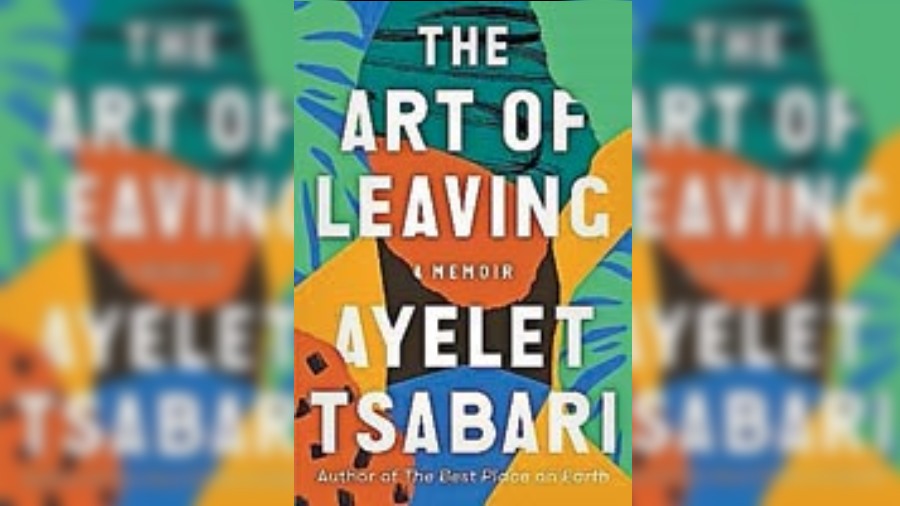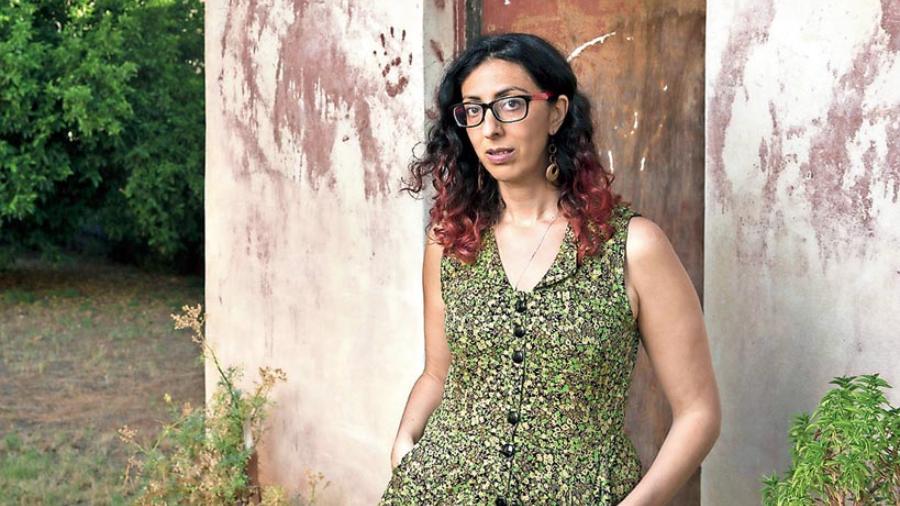Losing the greatest champion who had inspired her to write her first book at five, Ayelet Tsabari created the implacable memoir The Art of Leaving to confront her father’s death and understand the greatest sorrow of her life. Looking out of the window of her home in Tel Aviv, that is thickly forested with trees, bursting with parrots, Tsabari responds to my question about why she wrote this memoir with signature candour: “This book was a way to deal with grief. I wouldn’t say I necessarily knew it as I was writing. I was compelled to do it, as often is the case with memoir writing. And I always come back to writing about my father, because his death, his loss, was the inciting incident in my life. But only after I completed the writing and felt a sense of lightness, that I realised it gave me some comfort. I didn’t write for therapy or healing, but that was a bonus result.” I notice how ironical it is that her daughter, who is with Tsabari in that treed neighborhood in Tel Aviv, is exactly the same age that young Ayelet was when her father died.
It is easy to see why this memoir was a finalist for the Writer’s Trust Hilary Weston Prize and The Vine Awards, and an Apple Books and Kirkus Review Best Book.
Perhaps Tsabari’s greatest attraction as a global storyteller is her absolute veracity— no holds barred, she has her reader in thrall with her art of fashioning her tellings with a refreshing turn of phrase. And like the burgeoning tribe of diasporic and postcolonial writers whose mother tongue is not English, she employs the once colonizer’s language to tell her stories in her own voice, that are being read by hundreds of thousands of immigrants who live in English-speaking countries which are their adopted homeland. Thus, the narrative is studded with unexpected gems — visual, audial, culinary and cerebral: “The sky cracked open like an eggshell”; “I would wish that I was the one leaving because that would be better than being left behind”; “I know about death…Our country is haunted by its dead, weighed down by loss and remembrance.”
Food is a powerful tool for retrieval and an arsenal against any wasteland that accosts Tsabari. It is her mother’s inimitable cake, the ugat shmarim, that is the panacea to combat the isolation she must face in distant, freezing Canada. The chapter Yemeni Soup and other Recipes is the hallmark of how memories of her family and homeland Israel fuel this writer to assert her selfhood in the darkest hours of her life. The suturing to her first home, even when she has left Israel time and again, is electric. It is what many readers find irresistible in this memoir, and will appeal to the Indian reader
So how does she perceive herself, I ask. Does diasporic global soul Tsabari feel Yemeni, or Jewish or Canadian? “I am also Israeli, which may be the first identity that comes to mind as I was born and raised here. I returned to Israel after 20 years in Canada because I wanted to see if I belonged here. The jury is still out. I’ve been gone for so long that I feel a little bit like an immigrant here, in Israel, too. This may be a case of the immigrant predicament: you no longer belong anywhere, or maybe you belong everywhere? I think my writing tries to make sense of that question,” she affirms.
Her voice as a rebel, especially when she narrates her disgust for doing mandatory national service in the Israeli army, and her account of her fist marriage gone sour, her seeking for a way to belong in near and far-flung places — from Thailand to New York to Goa — her searching for a place to call home, her many heartbreaks to find love, her close encounters with men and women, are all a document of her thunderously busy quest to make up for the gaping wound of losing her most precious friend, her father. The “restlessness” of exile, that the renowned, brave and wise Christian Palestinian theorist Edward Said had spoken so compellingly of, becomes the lived experience of this Israeli-Yemeni-Jewish-Canadian writer. Said had posited that, “Exile for the intellectual is restlessness, movement, constantly being unsettled, and unsettling others…. You cannot go back to some earlier, stable condition of being at home; and alas, you can never fully arrive.”

The Art of Leaving: A Science Learnt in the Human Classroom; Random House, 320pp, Rs 599
In her continuous juggernaut existence, yoyo-ing between unfamiliar places to seek love, clarity and human connection, nomad Tsabari experimented with same-sex relationships and drugs. In recounting her self exploration, the bond with her short-lived female companion Sophie is perhaps one of the most poignant in her memoir. The Art of Leaving is a science Tsabari learnt well in the global classroom of the human condition.
A significant part of the memoir features India with the mark of the nostalgic longing for a first love. She confesses that. “I miss India. In my early 20s I spent more time there than I did in Israel. It was the first time that I was surrounded by people who, strangely and inexplicably, looked like me. It was a disorienting and surprising and wonderful feeling to be recognised and claimed. In my desperate need to belong, I wondered if maybe this could be home. I was so young then, so many of the troubling memories I chose to ignore or forget. It is Middle-Eastern and Indian food that I cook and love most.”
Tsabari added a charming anecdote about her Indian experience that is not in the book. “I will tell you one funny anecdote that didn’t make it into the book. I was a little rounder back then and my face had more baby fat and people often told me I looked like Tabu, the actress. At first, I didn’t understand why strangers yelled ‘Tabu, Tabu,’ after me in the streets! Then, one day, I was having dinner in Mahabalipuram and a group of ridiculously good-looking men kept staring at me. Finally, one approached me and said, “We Are Bollywood actors, and we just had to tell you that you look just like the actress we are working with right now. Her name is Tabu.”
Tsabari met her future husband (her first) Anand, whom she preferred to call and treat as her “boyfriend” in her hippie days in Goa where sand and sea and shacks on the beach were her rites of passage to self discovery. Some years later, as the need to belong and reside in Canada became an urgency, “marrying” Vancouver resident, Indo-Canadian Anand was more a necessity than an act of mad love. Captured in an unforgettable vignette of recorded personal history, Tsbari lays bare the irrepressible spirit of feminism in her refusal to cut the wedding cake with Anand. Recalling the disappointment this caused to Anand’s many tradition-bound relatives in Vancouver, the incident showcases Tsabari’s self-deprecating humour, a rare quotient of light-heartedness that is often lacking in a memoir. All along her journey it is her indomitable spirit, her unabashed courage to tell it like it is, to live on her own terms, that often takes the reader by surprise. Is her memoir consciously undergirded by feminist assertions of agency, and standing up to patriarchy? “I think this is an essential element of my memoir that is rarely discussed. As a young woman, it absolutely felt subversive and defiant in a way, wishing to break free from patriarchal expectations of me. But also, the fact that it felt so radical was on its own a testament to how oppressed women still are. It really shouldn’t be such a big deal, you know, to want to be free, to follow your heart.”
By definition, a memoir is specific and focused, telling the story of somebody’s life, focusing on an important event that occurred at a specific time and place. What is both arduous and demanding about selecting a genre like the memoir is the unreliability of accessing from an unstable archive, where forgetting is a reality. So how did Tsabari combat these challenges? She confesses: “The feeling readers have of “knowing the author” is a myth, but also the desired effect of memoir writing, something to paraphrase John Gardner’s term, The Fictional Dream. It is a curated version of the self. What guided me was firstly the story. I am a writer and I am always guided by storytelling. But sometimes there were other considerations, like people’s privacy.”
Catapulted by the splintered shards of her father’s memory, and inspired by his persistence in writing poetry, despite his own precarious health, Tsabari willed herself to collate her debut short story collection The Best Place on Earth, in 2015. Her earliest passion of keeping a journal since she was five years old was the engine that jumpstarted her into creative writing, which she now teaches. It won Tsabari the Sami Rohr Prize for Jewish Literature and it was a New York Times Book Review Editors’ Choice. Tsabari’s creativity spins on the unique fulcrum of provoking the reader to think outside the box, and insidiously works to make the global reader understand the urgency to celebrate diversity with the art of acceptance.
Julie Banerjee Mehta is an author of Dance of Life and co-author of the bestselling biography Strongman: The Extraordinary Life of Hun Sen. She has a PhD in English and South Asian Studies from the University of Toronto, where she taught World Literature and Postcolonial Literature for many years. She currently lives in Kolkata and teaches Masters English at Loreto College
